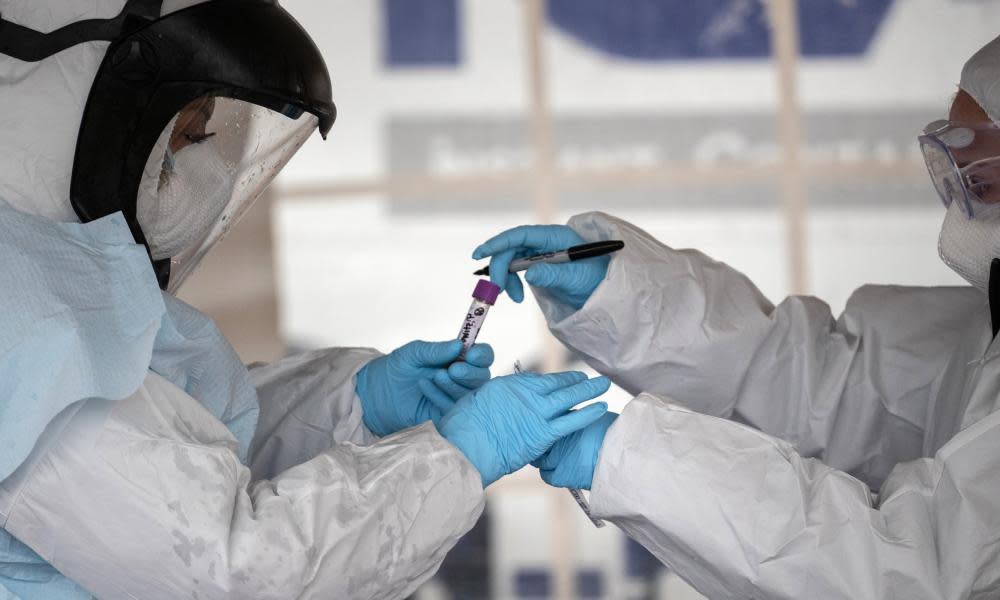US hospital workers fear prospect of working while sick amid virus surge

US hospitals are becoming vectors for the coronavirus pandemic, just as medical doctors in Italy warned in a recent paper published in the New England Journal of Medicine. “We are learning that hospitals might be the main Covid-19 carriers, as they are rapidly populated by infected patients, facilitating transmission to uninfected patients.”
Now healthcare providers worry they will be obliged to come to work even if they become sick.
Reports have emerged around the US of hospital workers testing positive in alarming numbers for the coronavirus and several workers dying from the virus as the US healthcare system struggles with supply shortages. Some healthcare professionals are even debating the notion of a do-not-resuscitate order for infected patients in order to lower the risk of infecting hospital workers.
The Guardian spoke with several hospital workers across the US who have expressed fears over the lack of preparation, equipment shortages and communication breakdowns on the frontlines in treating the coronavirus pandemic, with the prospect of being pressed to work through such difficulties.
“We have been told that we would, if we got sick, get short-term leave for that, but now they’re talking about even if you have symptoms you are to come to work,” said Kimberly Aspelin, a registered nurse at Charles regional medical center in La Plata, Maryland. “In the event that we no longer have supplies, we will still be required to care for the patients, without protective gear. As of now, they’re telling us to keep reusing our N95 masks, where we know we really shouldn’t be using them, but we are to continue using them because we will have none soon.”
A spokesperson for Charles regional medical center said in an email: “We emphatically and unequivocally stressed to all employees that if they are ill, have a fever, display flu-like symptoms or have cared for someone ill in their home that they should not report to work and immediately contact Employee Health for guidance.”

Lorie Quinn, an environmental services attendant at PeaceHealth Sacred Heart medical center at RiverBend in Springfield, Oregon, explained workers are making fabric face masks or making covers for N95 masks to try to use them longer.
“We are all working tirelessly. The most frustrating part, and there are many, is the lack of communication with the frontline caregivers,” said Quinn. “I don’t feel that our hospital was prepared at all for this pandemic. Three and a half weeks ago, when the first room came up for cleaning, our department had no direction from our supervisors or administration on how to clean and contain the items in the room.”
In Oakland, California, John Pearson, a registered nurse and president of SEIU Local 1021, explained their hospital, already suffering from understaffing and supply shortages, isn’t equipped to handle an expected surge in coronavirus cases.
“We don’t have a routine set in place to be screening workers, we don’t have rapid testing or much testing at all,” said Pearson. “What we have is absolute certainty of a mixing of people carrying this virus who don’t know it yet, and spreading it around the hospital to patients and other people, exacerbated by not having enough protective equipment and on top of that, zero training on coronavirus. We’ve gotten some emails and the emails wind up being contradictory advice and instruction.”
Several hospital workers who spoke to the Guardian requested to remain anonymous for fear of retaliation.
A registered nurse in a neonatal intensive care unit at a hospital in north-east Pennsylvania explained nurses in their department, which is already understaffed, are being pulled in and out to assist with coronavirus patients.
“There’s just no clear guidance on what our policy is if we do have somebody who comes in presenting signs and symptoms. Are we going to continue to take care of them on the floor where all these other healthy moms are trying to have the best experience they can in bringing a newborn baby into this situation?” the nurse said. “We were told that if we have symptoms we can continue to work as long as we protect ourselves with a mask if it’s available. There is nothing saying if we come in contact with a patient that we need to self-quarantine.”
The person cited a mother in delivery who presented coronavirus symptoms recently, and no one knew what to do, whether proper protective equipment would be available to workers, while nurses argued with a supervisor to provide the equipment.
“If there is an emergency, I have to make a split decision, do I risk myself and take care of that person or do I wait for the supplies to become available and then treat that person?” added the nurse.
Hospital workers in Washington DC described understaffing and confusion.
“We’re on the frontlines sanitizing these rooms every day, but we’re afraid because we don’t know who has the virus and they don’t inform us,” said a housekeeping aide at a Washington hospital.
In Pittsburgh, Pennsylvania, hospital workers also complained over a lack of preparation and communication to workers through the pandemic.
“It seems like they have nothing in place and that anything we find out is after the fact, from the media,” said a cafeteria worker at a University of Pittsburgh medical center hospital. They explained workers handle menus and food items from various patients, and receive supplies from several other hospitals, but are given no guidance on how to handle these supplies that are potential carriers of Covid-19. “If we don’t know how to protect ourselves, how can we protect the patients and their families? We can’t. This is so dangerous,” the worker said.
A spokesperson for PeaceHealth Sacred Heart medical center at RiverBend said in an email, “We are committed to safeguarding our valued EVS caregivers in this rapidly changing environment. We communicate daily to our EVS caregivers in a variety of ways about processes related to Covid-19.”

